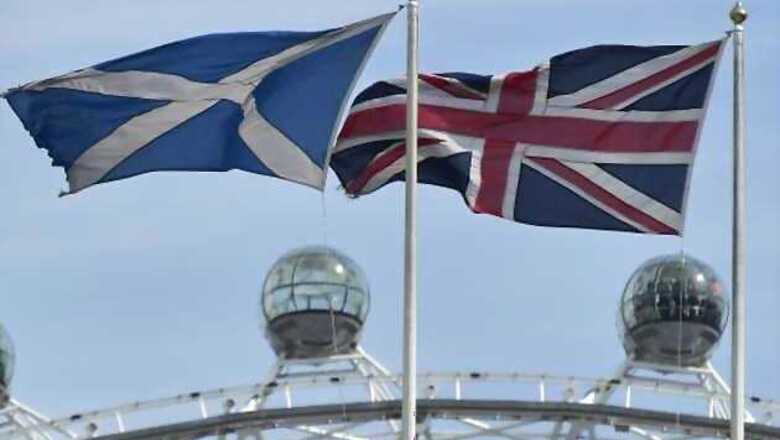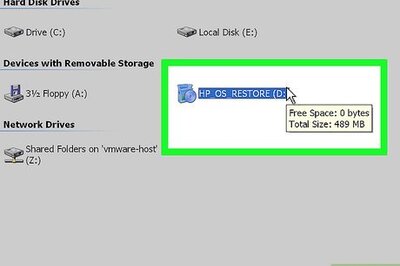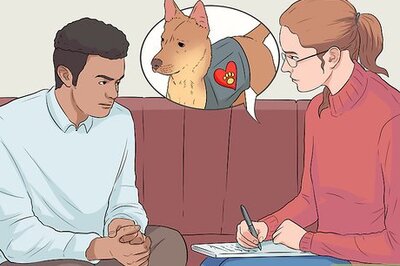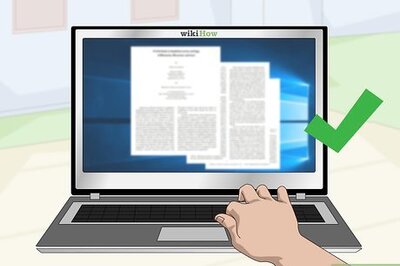
views
Glasgow: Campaigners for and against Scotland's independence focused their efforts on Glasgow on Friday as separatist leader Alex Salmond said he was confident of victory despite a new poll showing the pro-UK campaign recovering lost ground.
Salmond hit the streets under a leaden sky in the city with actor Peter Mullan, lashing out against what he called the "negative tactics" of the "No" camp.
As Salmond set out on a flying tour round Scotland's cities, pollsters warned the tide might be turning against him ahead of Thursday's knife-edge vote.
The new survey was published after a string of major banks -- RBS, Tesco Bank, TSB, Lloyds and Clydesdale Bank -- issued market advisories on their contingency plans in the event of independence, suggesting they may move their headquarters to England.
Meanwhile department store John Lewis and supermarket ASDA warned that shoppers would be likely to face higher prices post-independence.
However, Salmond said he was feeling confident.
"I am more confident than ever that the people of Scotland are going to say 'Yes'," he wrote in the Daily Record newspaper.
Salmond was flying to Aberdeen, Inverness and Dundee, while Sturgeon visits Glasgow, Edinburgh and Stirling before they team up in Perth.
"Surely it's time to say goodbye to the days when decisions about our lives were made by remote Westminster (London)governments," Salmond wrote.
"No-one on the 'Yes' side says independence is a magic wand. It isn't. Of course there will be challenges to face and we won't succeed overnight.
"But we'll be equipped with the powers, if we use them well, to build a better country."
'Yes' bandwagon stalled: pollster
A vote for independence would end the 307-year-old union between England and Scotland and create Europe's newest state since the disintegration of Yugoslavia in the 1990s.
A survey out Sunday put the "Yes" camp ahead for the first time, sending Britain's major party leaders rushing up to Scotland to promise new devolved fiscal powers if Scots vote to stay in the UK.
But a YouGov poll published Friday in The Times newspaper put the "No" camp four points ahead on 52 percent, once undecided voters were stripped out -- the first time they have recorded the pro-union side gaining ground since early August.
The online survey of 1,268 adults was conducted from Tuesday to Thursday.
YouGov president Peter Kellner said their polling found more people feeling they would be worse off in an independent Scotland -- particularly women -- and worried about what might happen to their bank accounts.
He said the intervention this week of Labour former British prime minister Gordon Brown, a Scot who served 10 years as finance minister, had seemingly halted the haemorrhaging of Labour voters to the SNP cause.
"Since Brown entered the debate, the 'Yes' bandwagon, which had been rolling so dramatically, has stalled. His warnings that independence would be bad for jobs and family finances have struck home," he wrote in The Times.
"If Salmond is to get his campaign back on track, he must, once more, reassure his fellow Scots that independence will not threaten their jobs and living standards.
"He has lost this week's skirmishes; the next seven days will tell us whether he has lost the war."
On the campaign trail, Labour opposition leader Ed Miliband was due at an anti-independence rally in Glasgow alongside Brown in Glasgow.
Meanwhile anti-EU firebrand Nigel Farage was also to visit Scotland's biggest city claiming that independence, while seeking continued European Union membership, was not really independence at all.
Scotland makes up a third of the United Kingdom's territory and 8.4 percent of its population.
Scottish independence would leave the United Kingdom "diminished globally as a nation", Farage told BBC radio.
"The message that goes out that you've lost a large chunk of your territory and that a 300-year-old union that has achieved astonishing successes for democracy and freedom worldwide has suddenly broken up, that's not a good message."

















Comments
0 comment